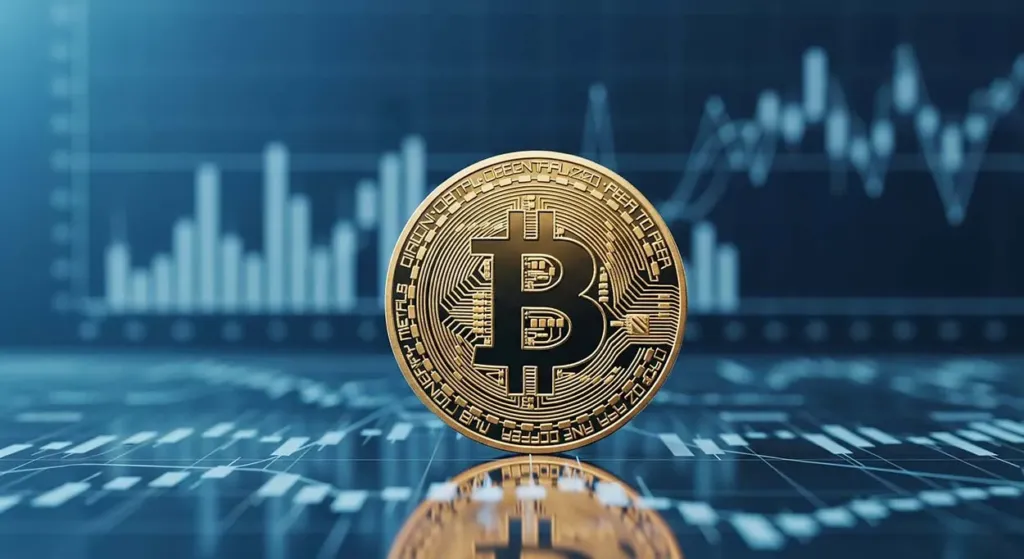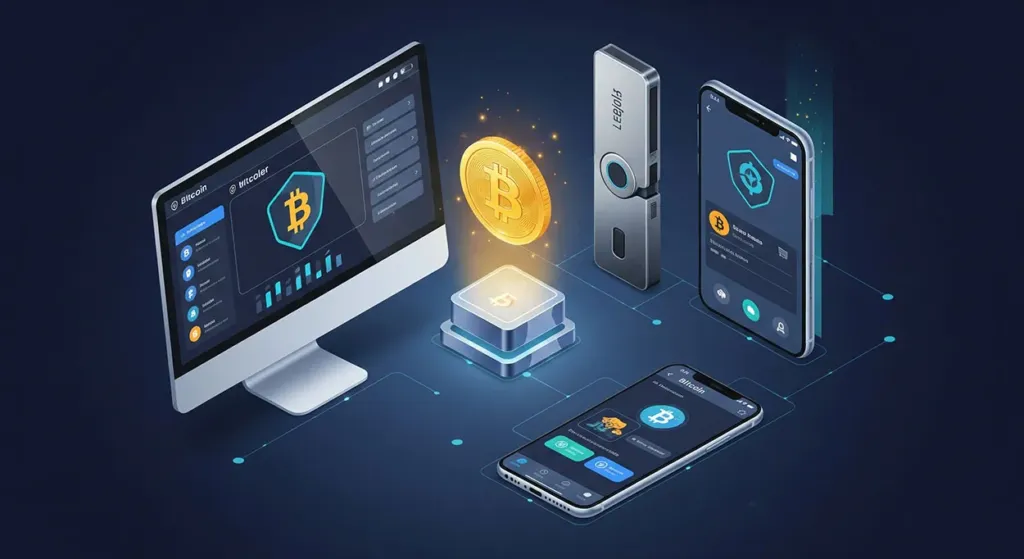You’ve heard about Bitcoin everywhere. Your neighbor made money with it. Your coworker lost money too. The news talks about it daily.
But what exactly is Bitcoin? How does it actually work? Why do people care so much about digital coins they can’t even touch?
If you’re completely new to Bitcoin, you’re in the right place. This guide explains everything in plain English.
We’ll start from zero. No prior knowledge needed. No confusing technical terms. Just simple explanations anyone can understand.
By the end, you’ll know exactly how Bitcoin works. You’ll understand why people invest in it. Most importantly, you’ll decide if Bitcoin is right for you.
Think of this as your friendly introduction to digital money. Let’s explore this fascinating world together, one simple step at a time.
What Exactly Is Bitcoin?
Think of Bitcoin as digital cash. But unlike regular money, no government or bank controls it.
Bitcoin exists purely as computer code. You can’t hold physical Bitcoin coins in your hand.

It’s created through a process called mining. Computers solve complex math problems to create new Bitcoin.
Only 21 million Bitcoin will ever exist. This scarcity makes it valuable, like gold.
People buy Bitcoin as an investment. Others use it to send money across borders quickly.
The Story Behind Bitcoin’s Creation
In 2008, someone called Satoshi Nakamoto published a mysterious paper. Nobody knows who this person really is.
The paper described a new type of money. Money that worked without banks or governments.
Bitcoin launched in January 2009. The first transaction was pizza purchased for 10,000 Bitcoin.
Today, those same Bitcoin would be worth millions of dollars. That’s some expensive pizza.
Early adopters became millionaires. They believed in Bitcoin when others laughed.
How Bitcoin Actually Works
Bitcoin runs on something called blockchain technology. Think of it as a digital ledger book.
Every Bitcoin transaction gets recorded in this ledger. Once recorded, it can’t be changed or deleted.
Thousands of computers around the world maintain copies of this ledger. They all must agree on every transaction.
This system eliminates the need for banks. People can send money directly to each other.
The blockchain makes Bitcoin transparent. Anyone can see all transactions, but identities remain private.
Understanding Bitcoin Mining
Mining isn’t about digging in the ground. It’s about computers solving puzzles.
Miners use powerful computers to process Bitcoin transactions. They compete to solve mathematical problems first.
The winner gets rewarded with new Bitcoin. This process creates new coins and secures the network.
Mining requires enormous amounts of electricity. Some people criticize Bitcoin for environmental impact.
As more miners join, puzzles become harder. This keeps Bitcoin creation steady and predictable.
Bitcoin Wallets Explained Simply
A Bitcoin wallet stores your digital coins. But it doesn’t actually hold Bitcoin inside.
Instead, wallets store special keys. These keys prove you own specific Bitcoin on the blockchain.

Think of keys like passwords. Lose your keys, lose your Bitcoin forever.
Hot wallets connect to the internet. They’re convenient but less secure than cold storage.
Cold wallets stay offline. They’re like safes for your Bitcoin keys.
Different Types of Bitcoin Wallets
Software Wallets
- Mobile phone apps
- Computer programs
- Easy to use daily
- Connected to internet
Hardware Wallets
- Physical devices
- Maximum security
- Store keys offline
- Cost money upfront
Paper Wallets
- Keys printed on paper
- Completely offline storage
- Risk of physical damage
- Free to create
Web Wallets
- Online services
- Accessible anywhere
- Company controls keys
- Higher security risks
How Bitcoin Transactions Work
Sarah wants to send Bitcoin to John. She opens her wallet app.
Sarah enters John’s Bitcoin address. These addresses look like random letters and numbers.
She specifies the amount and pays a small transaction fee. Higher fees process faster.
Sarah’s wallet creates a digital signature. This proves she owns the Bitcoin being sent.
The transaction broadcasts to the Bitcoin network. Miners compete to include it in the blockchain.
Once confirmed, John receives the Bitcoin. The transaction becomes permanent and unchangeable.
Bitcoin’s Security Features
Bitcoin uses military-grade encryption. The same technology protects government secrets.
Each transaction requires a unique digital signature. Forging signatures is mathematically impossible.
The distributed network makes Bitcoin nearly hack-proof. Attacking one computer won’t work.
Hackers would need to control most Bitcoin computers simultaneously. This costs billions of dollars.
Bitcoin has never been successfully hacked in its 15-year history.
Why Bitcoin Has Value
Bitcoin’s value comes from several factors working together.
Limited supply creates scarcity. Only 21 million Bitcoin will ever exist.
Growing demand from investors and companies drives prices up.
Bitcoin works globally without restrictions. No borders, no banking hours.
It can’t be inflated away like regular currencies. Governments can’t print more Bitcoin.
Some people view Bitcoin as digital gold. A store of value for uncertain times.
Common Bitcoin Myths Debunked
| Myth | Reality |
|---|---|
| Bitcoin is completely anonymous | All transactions are publicly visible on the blockchain |
| Bitcoin is mainly used for crime | Less than 1% of Bitcoin transactions involve illegal activity |
| Bitcoin has no real value | Major companies and countries now accept Bitcoin as payment |
| Bitcoin can be easily hacked | The Bitcoin network has never been successfully attacked |
| Bitcoin is a bubble that will burst | Bitcoin has survived multiple price crashes and recovered stronger |
Advantages of Using Bitcoin
Bitcoin transactions happen 24/7. Banks close, but Bitcoin never sleeps.
International transfers complete in minutes, not days. No waiting for bank processing.
Transaction fees are often lower than traditional money transfers.
You control your money directly. No bank can freeze your Bitcoin account.
Bitcoin works in countries with unstable currencies. It provides financial stability.
Disadvantages and Risks
Bitcoin prices change dramatically. Your investment could lose value quickly.
Once sent, Bitcoin transactions can’t be reversed. No customer service to call.
Losing wallet keys means losing Bitcoin forever. No password reset option exists.
Some merchants don’t accept Bitcoin yet. Adoption is still growing.
Regulatory changes could affect Bitcoin’s future. Governments are still deciding rules.
How to Buy Your First Bitcoin
Choose a reputable cryptocurrency exchange. Popular options include Coinbase, Binance, and Kraken.
Create an account and verify your identity. This requires government-issued ID.
Link a bank account or credit card. Some exchanges accept multiple payment methods.
Start with a small amount you can afford to lose. Bitcoin is volatile.
Transfer Bitcoin to your personal wallet. Don’t leave coins on exchanges long-term.
Storing Bitcoin Safely
Never share your private keys with anyone. They’re like the combination to your safe.
Write down your wallet’s recovery phrase. Store it somewhere secure offline.
Use strong, unique passwords for all Bitcoin-related accounts.
Enable two-factor authentication wherever possible. This adds extra security layers.
Consider hardware wallets for large amounts. They’re worth the investment.
Bitcoin’s Environmental Impact
Bitcoin mining consumes significant electricity. Critics worry about environmental effects.
However, many mining operations use renewable energy sources. Solar and wind power are common.
Bitcoin’s energy use secures a global financial network. This provides enormous value.
Traditional banking systems also consume vast amounts of energy. The comparison isn’t straightforward.
New technologies are making Bitcoin mining more energy-efficient over time.
Bitcoin vs Traditional Currency
Traditional money is issued by governments. Bitcoin has no central authority.
Banks process traditional payments. Bitcoin processes its own transactions.
Governments can print more traditional money. Bitcoin’s supply is fixed forever.
Traditional currencies lose value through inflation. Bitcoin aims to preserve value.
Banks can freeze traditional accounts. Nobody can freeze your Bitcoin.
The Future of Bitcoin
Bitcoin adoption continues growing worldwide. More companies accept Bitcoin payments.
Some countries are making Bitcoin legal tender. El Salvador was the first.
Financial institutions are offering Bitcoin investment products. This brings mainstream acceptance.
Technology improvements make Bitcoin faster and cheaper to use.
Bitcoin could become a global reserve currency. Many experts believe this is possible.
Tax Implications of Bitcoin
Most countries treat Bitcoin as property, not currency. This affects taxation.
Buying Bitcoin usually isn’t taxable. But selling Bitcoin often creates tax obligations.
Using Bitcoin to buy things may trigger capital gains taxes.
Keep detailed records of all Bitcoin transactions. You’ll need them for tax filing.
Consult a tax professional familiar with cryptocurrency. Rules are complex and changing.
Bitcoin Investment Strategies
Dollar-Cost Averaging Buy small amounts regularly regardless of price. This reduces timing risk.
HODLing Buy and hold Bitcoin long-term. Ignore short-term price fluctuations.
Trading Buy low, sell high repeatedly. This requires skill and carries high risk.
Diversification Don’t put all money into Bitcoin. Spread risk across multiple investments.
Common Bitcoin Mistakes to Avoid
Don’t invest more than you can afford to lose. Bitcoin is highly speculative.
Never give private keys to anyone claiming they can increase your Bitcoin.
Don’t fall for “get rich quick” Bitcoin schemes. They’re usually scams.
Avoid keeping Bitcoin on exchanges long-term. You don’t control the keys.
Don’t panic sell during price drops. Bitcoin has always recovered historically.
Bitcoin’s Role in Financial Freedom
Bitcoin gives people control over their money. No bank permission required.
It provides financial services to the unbanked. Anyone with internet can use Bitcoin.
Bitcoin protects against currency devaluation. Especially important in unstable economies.
It enables true peer-to-peer transactions. No intermediaries taking fees.
Bitcoin represents a new form of financial sovereignty. You are your own bank.
Getting Started: Your Next Steps
Start learning more about Bitcoin technology. Knowledge reduces investment risk.
Choose a reputable exchange and create an account. Take time to understand their fees.
Buy a small amount of Bitcoin to practice. Experience teaches better than theory.
Download a wallet app and transfer your Bitcoin. Practice receiving and sending.
Join Bitcoin communities online. Learn from experienced users and ask questions.
Final Thoughts: Your Bitcoin Journey Begins
Bitcoin represents more than digital money. It’s a technological revolution changing finance forever.
Understanding Bitcoin takes time and patience. Don’t expect to master it overnight.
Start small and learn gradually. Every expert was once a beginner.
The Bitcoin network grows stronger with each new user. You’re joining something historic.
Whether Bitcoin succeeds or fails, you’ll have learned about the future of money.
